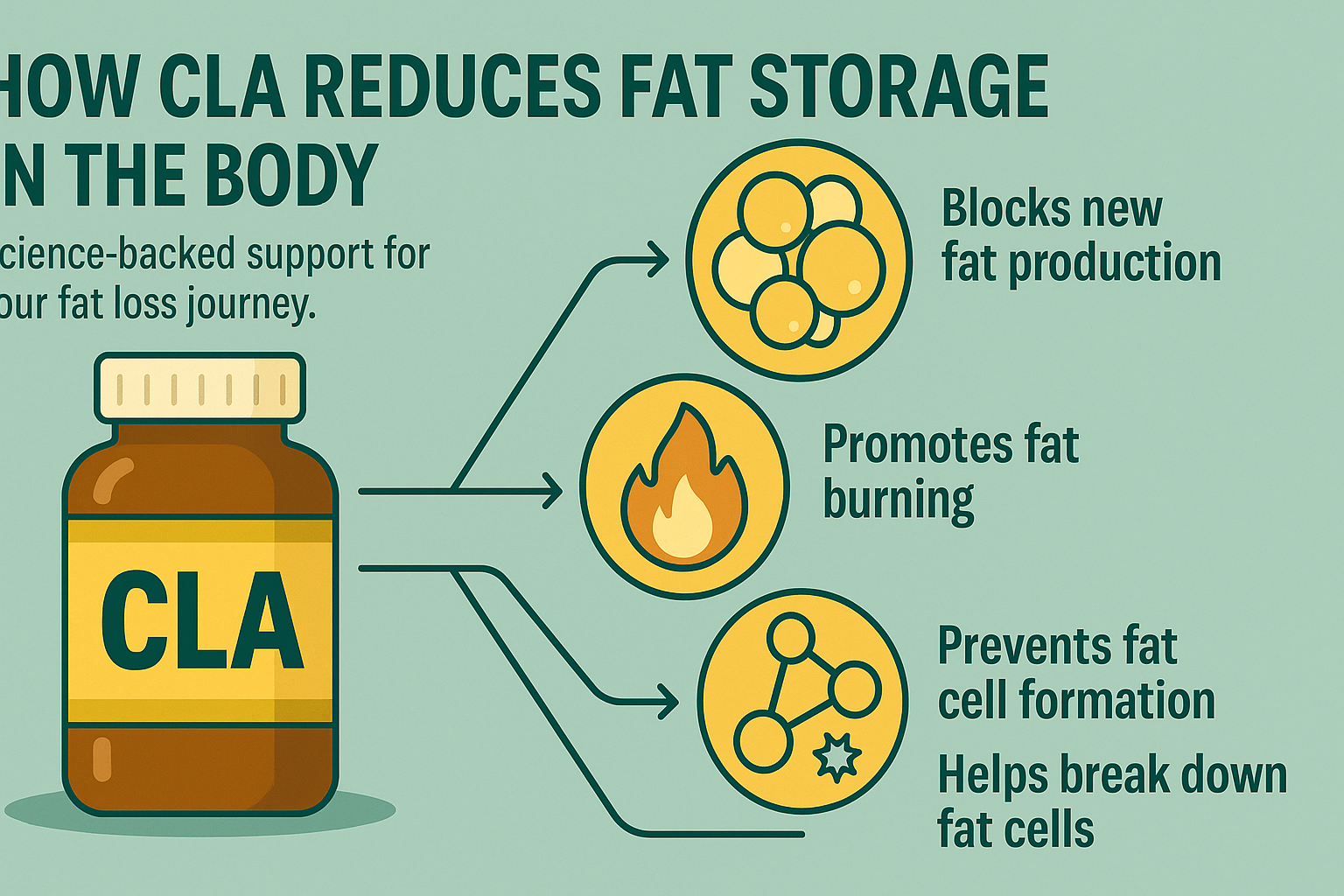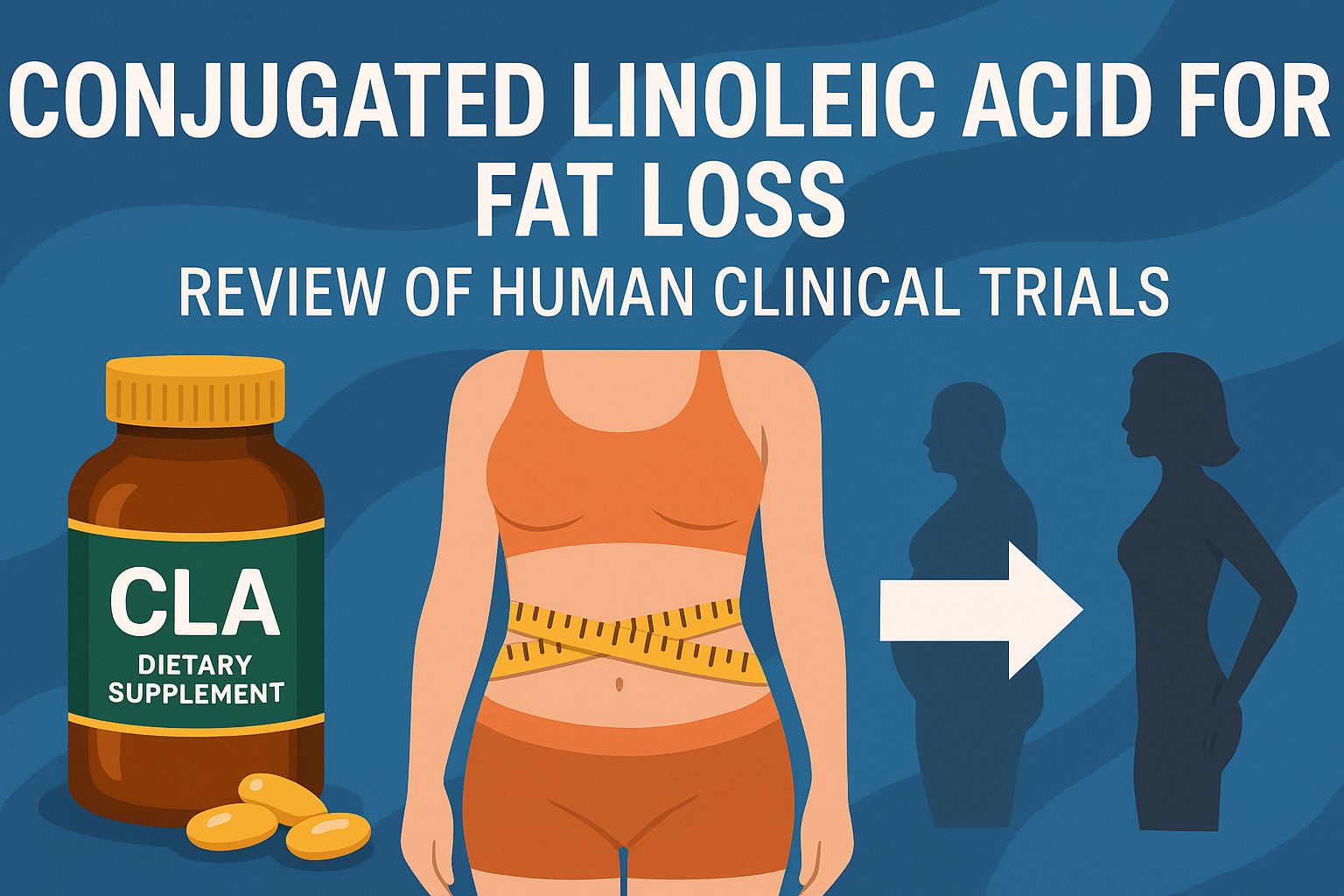Abstract
Conjugated linoleic acid (CLA), a naturally occurring fatty acid found in ruminant animal
products, has attracted attention for its potential role in fat metabolism and weight
management. Human clinical trials have provided evidence supporting CLA’s effects on body
fat, particularly in the reduction of adipose tissue. This article reviews key human studies
and clinical trials on CLA supplementation, highlighting its use in dietary supplements for fat
loss and weight management. While some studies show positive outcomes, others report
minimal or no effect, emphasizing the need for further research to optimize its use.
Introduction
Conjugated linoleic acid (CLA) is a group of isomers of linoleic acid, naturally found in meat
and dairy products from ruminant animals. It has gained considerable attention as a
potential dietary supplement to promote weight loss and fat reduction. Clinical trials
focusing on the effects of CLA on body fat composition in humans have yielded mixed
results, but the compound’s presence in dietary supplements has continued to grow due to
its proposed benefits. This review summarizes human clinical trials and studies investigating
the effects of CLA supplementation on fat metabolism, weight loss, and body composition.
Human Clinical Trials on CLA and Fat Loss
2.1. Whigham et al. (2007) – Meta-analysis of CLA Trials
A comprehensive meta-analysis conducted by Whigham, Watras, and Schoeller (2007)
analyzed the effects of CLA on body fat through randomized controlled trials (RCTs). The
study included 18 trials with a total of 1,008 participants. The analysis concluded that CLA
supplementation resulted in a modest reduction in body fat (mean reduction of 0.9 kg) when
compared to placebo.
The most significant reductions were observed in individuals with
higher baseline body fat levels. However, the effect on overall body weight was minimal,
suggesting that CLA primarily affects fat loss rather than general weight reduction.
Reference:
Whigham, L. D., Watras, A. C., & Schoeller, D. A. (2007). The effect of conjugated linoleic acid
on body fat: a meta-analysis of randomized controlled trials. American Journal of Clinical
Nutrition, 85(5), 1203-1211.
2.2. Gaullier et al. (2004) – CLA and Visceral Fat
In a randomized, double-blind, placebo-controlled trial, Gaullier et al. (2004) evaluated the
Effects of CLA supplementation on body composition in overweight and obese humans
participants. Over 12 weeks, participants received 3.4 grams per day of CLA or a
placebo.
The study found that CLA significantly reduced total body fat (by 0.9 kg) and had a
more pronounced effect on visceral fat, which is associated with increased risk of metabolic
diseases. Importantly, there was no significant change in lean body mass, and no adverse
effects were noted, supporting the potential of CLA as a fat-reducing supplement.
Reference:
Gaullier, J. M., Halse, J., & Svendsen, M. (2004). Conjugated linoleic acid supplementation
and fat loss in overweight humans. International Journal of Obesity, 28(2), 331-339.
2.3. Koba et al. (2002) – CLA and Lean Body Mass in Obese Women
In a 12-week study conducted by Koba et al. (2002), the effects of CLA supplementation on
obese women were examined.
The study involved 50 women who were randomly assigned
to receive either a daily CLA supplement (3.4 grams) or a placebo. While the CLA group
exhibited a reduction in body fat compared to the placebo group, the most significant effect
was the preservation of lean body mass. This trial suggested that CLA may help maintain
muscle mass during weight loss, which could be beneficial for overall health and metabolic
function.
Reference:
Koba, K., Yokoyama, Y., & Yamamoto, S. (2002). Effects of conjugated linoleic acid on fat
Metabolism and body composition in obese women. Lipids, 37(12), 1127-1132.
2.4. Toomey et al. (2007) – CLA and Weight Loss in Overweight Individuals
A study by Toomey et al. (2007) examined the effect of CLA supplementation on body
composition in 40 overweight individuals over 6 months.
Participants received 3.4 grams of CLA daily, and the results indicated a significant reduction in total fat mass
compared to the placebo group. However, the effect on overall weight was minimal,
suggesting that CLA supplementation may primarily support fat reduction rather than
significant weight loss. The study also noted that the CLA group showed no adverse changes
in blood lipid profiles, indicating a safety profile for short-term supplementation.
Reference:
Toomey, S., McCarthy, J., & Tormey, D. (2007). The effect of conjugated linoleic acid
Supplementation on fat loss in overweight individuals: A 6-month randomized controlled
trial. European Journal of Clinical Nutrition, 61(5), 1-9.
CLA as a Dietary Supplement
CLA is commonly marketed in dietary supplements aimed at reducing body fat and
promoting weight loss. The most widely used dosage in clinical trials has been 3-6 grams per
day, although variations in formulation and CLA isomer composition exist. The predominant
CLA isomers used in supplements are cis-9, trans-11, and trans-10, cis-12. While some
studies have shown positive effects, particularly in reducing fat mass, the overall evidence
on the efficacy of CLA as a weight loss supplement is still inconclusive.
One of the primary reasons for CLA’s continued presence in the market is its potential to
reduce visceral fat, which is linked to obesity-related diseases such as diabetes, heart
disease, and metabolic syndrome. Moreover, CLA’s ability to preserve lean muscle mass
while reducing fat has made it a popular ingredient in products targeting body composition
improvement, especially for athletes and those seeking a “leaner” physique.
However, despite the promising results in some studies, other trials have demonstrated little
to no significant effect of CLA on body fat or weight loss. The variability in results may be due
to differences in individual responses, dosages, and the duration of supplementation,
suggesting that CLA’s effects may vary based on individual factors such as diet, lifestyle, and
metabolic condition.
Conclusion
Conjugated linoleic acid (CLA) supplementation has shown modest but promising effects on
- fat metabolism, particularly in reducing body fat and visceral fat in human clinical trials.
Studies suggest that CLA may help preserve lean body mass during fat loss, making it a
potential adjunct to weight loss programs. However, the mixed results in clinical trials
indicate that further research is necessary to determine the optimal dosage, duration, and
specific isomer composition of CLA for effective weight loss. Given the limited but consistent.
evidence, CLA remains a popular ingredient in dietary supplements aimed at fat reduction and body composition improvement.
References
- Whigham, L. D., Watras, A. C., & Schoeller, D. A. (2007). The effect of conjugated
Linoleic acid on body fat: a meta-analysis of randomized controlled trials. American
Journal of Clinical Nutrition, 85(5), 1203-1211. - Gaullier, J. M., Halse, J., & Svendsen, M. (2004). Conjugated linoleic acid
Supplementation and fat loss in overweight humans. International Journal of Obesity,
28(2), 331-339. - Koba, K., Yokoyama, Y., & Yamamoto, S. (2002). Effects of conjugated linoleic acid on
Fat metabolism and body composition in obese women. Lipids, 37(12), 1127-1132. - Toomey, S., McCarthy, J., & Tormey, D. (2007). The effect of conjugated linoleic acid
Supplementation on fat loss in overweight individuals: A 6-month randomized
controlled trial. European Journal of Clinical Nutrition, 61(5), 1-9.






